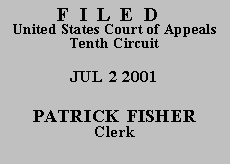

| RICHARD HERNANDEZ,
Petitioner-Appellant, |
|
| v. | |
| ADDISON, Warden,
Respondent-Appellee. |
|
Petitioner Richard Hernandez, a state prisoner appearing pro se, seeks a certificate of appealability to appeal the dismissal of his 28 U.S.C. § 2254 habeas action for failure to exhaust his state remedies. We deny a certificate of appealability and dismiss the appeal.
Hernandez pleaded guilty in state court to conspiracy to distribute marijuana and was sentenced to a fifteen-year term of imprisonment on August 21, 1998. He did not file a direct appeal from his conviction or sentence. On August 26, 1999, he filed an application for state post-conviction relief, arguing his plea of guilty was not knowing or voluntary and that he received ineffective assistance of counsel. On November 3, 1999, the state court ordered Hernandez to advise the court whether he wanted to pursue his post-conviction application. On March 1, 2000, the court found he had not notified the court of his intentions and dismissed his application as abandoned. Hernandez did not appeal the dismissal.
In his 28 U.S.C. § 2254 petition, Hernandez alleged he received ineffective assistance of counsel, his guilty plea was not voluntary, and the prosecutor failed to disclose evidence favorable to Hernandez. Respondent filed a motion to dismiss for failure to exhaust state court remedies, and Hernandez filed a response. On October 31, 2000, the district court found Hernandez had not exhausted his state court remedies as required by 28 U.S.C. § 2254(b) and dismissed the action.
A state prisoner cannot obtain federal habeas corpus relief "unless it appears that the applicant has exhausted the remedies available in the courts of the State, or there is an absence of available State corrective process or circumstances exist that render such process ineffective to protect the rights of the applicant." 28 U.S.C. § 2254(b)(1). The exhaustion requirement is satisfied if the federal issue has been properly presented to the highest state court, either by direct review of the conviction or in a post-conviction attack. Dever v. Kan. State Penitentiary, 36 F.3d 1531, 1534 (10th Cir. 1994). A state prisoner bringing a federal habeas corpus action bears the burden of showing that he has exhausted available state remedies. Miranda v. Cooper, 967 F.2d 392, 398 (10th Cir. 1992).
Hernandez has not met his burden of showing he has exhausted his state remedies. The issues raised have not been presented to the highest court in Oklahoma because Hernandez did not file a direct appeal or pursue his post-conviction remedies. He asks this court either to excuse his failure to exhaust, which we cannot do because he is statutorily required to exhaust his remedies, or to stay the current proceedings so he can exhaust his state court remedies.
We DENY a certificate of appealability because Hernandez has failed to make a substantial showing of the denial of a constitutional right. 28 U.S.C. § 2253(c)(2). The appeal is DISMISSED. The request to proceed in forma pauperis is DENIED. The mandate shall issue forthwith.
Entered for the Court
Mary Beck Briscoe
Circuit Judge
*.This order and judgment is not binding precedent, except under the doctrines of law of the case, res judicata, and collateral estoppel. The court generally disfavors the citation of orders and judgments; nevertheless, an order and judgment may be cited under the terms and conditions of 10th Cir. R. 36.3.